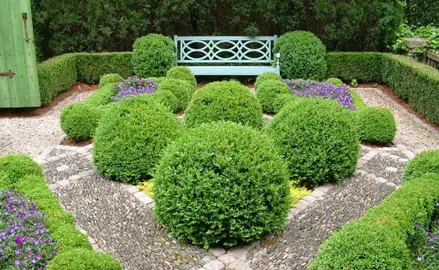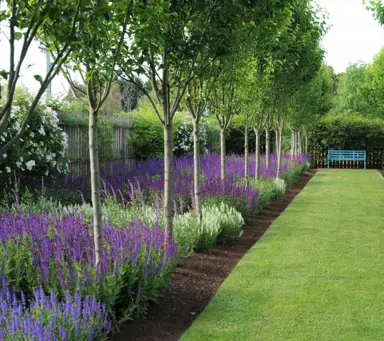
The Plant Company grows, sells, and ships Cedrus trees throughout NZ. We pride ourselves on producing high quality plants and seeing the joy from our customers when they receive them. We do hope you enjoy them and support this NZ business that is passionate about plants.
Cedrus atlantica 'Glauca', also known as Blue Atlas Cedar, is a striking evergreen conifer ideal for New Zealand gardens. Its silvery-blue needles...
Cedrus deodara, commonly known as the Deodar Cedar, is a large and stately, evergreen conifer that grows to about 30 m tall and 10 m wide. It has a...
Cedrus atlantica, commonly known as the Atlantic Cedar, is a large and stately tree. It bears blue-green, needle-like foliage held on horizontal...
Cedrus atlantica 'Aurea' is an upright conifer grown for its impressive new foliage, which is golden yellow. This growth matures to green in the...
Cedrus atlantica 'Glauca Pendula', commonly known as the Weeping Blue Cedar, is a conifer grown for its foliage and pendulous growth habit. This slow...
Cedrus deodara Aurea, commonly known as the Himalayan Cedar or Golden Deodar, is a variety of Cedar grown for its foliage and form. New growth is...
Cedrus deodora Vinks Gold, commonly known as Yellow Cedar or Indian Cedar, is a variety of Cedar grown for its foliage and form. New growth is bright...
Cedrus libani, commonly known as the Cedar Of Lebanon Plant, is a large and stately tree. This Cedar bears blue-green, needle like foliage held on...
Growing trees such as Cedar deodara in your garden delivers a vast range of benefits:
We have the largest variety of Cedar, and the right one for your space. These have been selected to thrive in NZ’s climate. We stock only the highest quality plants, sourcing them locally, and from NZ’s leading nurseries. Each plant is packed and transported with extreme care, ensuring it arrives to you in the same condition it was in when it left the nursery. If you are wanting to buy Cedar deodara, shop with confidence from the best in the industry.
Yes, you can grow cedar in New Zealand and the common species are:
Cedrus deodara is a relatively fast-growing tree, and can grow at 60-90 cm per year in ideal conditions. However, its growth rate will vary depending on the climate, soil conditions, and how well it is looked after.
Deodar cedars prefer full sun to partial shade and moist, well-drained soil. With proper care, they can thrive for many years and provide you with a beautiful and rewarding addition. Here are some tips:
If you are considering planting a Deodar cedar, be sure to choose a spot that will accommodate its mature size. They can grow to be 20-30 m tall and 10-15 m wide.
The price of a Cedar depends on its size and age. A small grade is likely to be around $20, whereas a larger and older plant can be $500. The Plant Company recommends avoiding very small plants as they take a lot of effort to get established and can die easily.
The best cedar for you will depend on your specific needs and preferences. Some factors to consider include:
Here are a few popular cedar trees to consider:
If you are not sure which cedar tree is right for you, consult with The Plant Company, we’re here to help.
Cedar trees are a good choice for a variety of reasons:
However, there are a few potential drawbacks to cedar trees. They can be slow-growing, especially when young.
Both "cedar" and "Cedrus" are correct, depending on the context.
The common name for Cedrus depends on the specific species within the genus. Nonetheless, Cedar is the most common and widely accepted term for any member of the Cedrus genus. It's perfectly fine to use in most situations, especially when not referring to a specific species.
Choosing the most appropriate name depends on context and specificity. In daily conversation, "cedar" is usually enough. When aiming for precision, especially in horticultural or scientific settings, using the specific common name like "Deodar Cedar" for Cedrus deodara gives better clarity.
Cedrus, or commonly known as cedar, has a long and diverse history of uses across various domains:
Traditional Building Materials:
Medicine and Aromatherapy:
Other Uses:
It's important to note that some uses, like medicinal applications, should be consulted with a healthcare professional before implementing.
Cedar is good for many things! It's a versatile and valuable wood with a variety of uses, both practical and aesthetic.
Durability and Resistance:
Aromatic and Pest-Repellent Properties:
Other Applications:
Species and Uses:
Overall, cedar is a versatile and valuable wood with a wide range of applications. Its durability, resistance to rot and insects, pleasant aroma, and pest-repellent properties make it a popular choice for both practical and aesthetic uses.
Whether you need assistance finding the plant you’re looking for or you simply want to know more about who we are and what we do, we invite you to get in touch with us today. A member of The Plant Company team will get back in touch as soon as possible.


